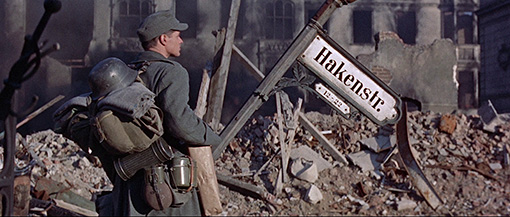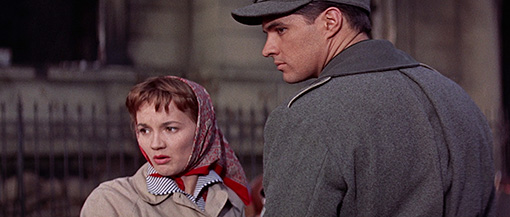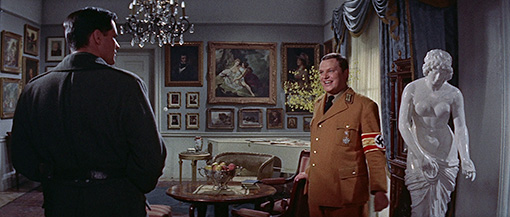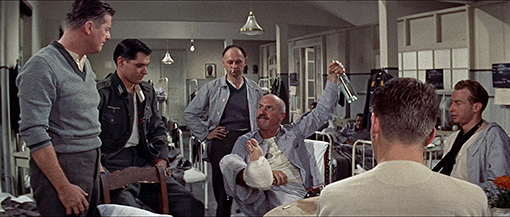| |
"I put a lot of myself into the love part of the picture. It is a story very close to my concerns, especially the brevity of happiness. I am not as pessimistic as I may sometimes appear. I do believe in happiness... happiness must be there, because it can be destroyed. Besides, a flawless happiness would be like a badly written poem." |
| |
Douglas Sirk in Sirk on Sirk: Conversations with
Jon Halliday
by Jon Halliday (Faber & Faber, 1997) |
| |
"I have never found wartime Germany so credible as in watching this American film made in peacetime." |
| |
Jean-Luc Godard on A Time to Love and a Time to Die,
Cahiers du cinéma, April 1959 |
In some ways the 1958 A Time to Love and a Time to Die is not what we might think of as typical of its belatedly celebrated director Douglas Sirk, despite elements that have his distinctive stamp all over them. There are no forbidden desires here, no barely suppressed lust or temptations to infidelity, just a boy who meets a girl in the final stages of World War 2 and decides he wants to marry her. The only problem is, Ernst is a German soldier on a three-week furlough from the Russian front and Elizabeth is the daughter of a doctor who has been arrested by the Gestapo and transported to a concentration camp.
A Time to Love and a Time to Die was adapted by Orin Jannings from the highly respected novel of the same name by German WW1 veteran Erich Maria Remarque, who also appears in the film in a key supporting role as Ernst's former teacher Professor Pohlmann, a humanitarian who puts his life at risk to hide and assist a Jew. The book's wartime setting and humanist message have seen it redubbed by some as 'All Quiet on the Eastern Front', a direct reference to Remarque's most celebrated novel, All Quiet on the Western Front, which itself became the basis for one of the finest of all anti-war films.

Even by Sirk's standards, A Time to Love and a Time to Die is a downbeat movie, a series of false hopes for Ernst and Elizabeth that are repeatedly undercut by the grim reality of the world in which they are forced to live, a Germany that has inflicted unimaginable pain and destruction on others and is now facing social collapse as a consequence. I'm assuming that Sirk and Jannings have been faithful to their source material (it seems unlikely that Remarque would have agreed to act in a film that bowdlerised his novel), right down to an ending whose startling abruptness has narrative logic but still feels some years ahead of its time.
From a modern perspective it's difficult to appreciate just how bold the set up and story development of A Time to Love and a Time to Die must have seemed in its day, at least for a Hollywood movie. Made just thirteen years after the end of the war, it's lead character is a German soldier and a good many of his comrades and those he encounters are portrayed in a sympathetic light. The corrupt and morally bankrupt Nazis are there, but they are not demonised in the traditional manner but given very human faces and rounded personalities. Sirk doesn't hammer home what makes them and their actions monstrous, but allows both to insidiously emerge through their own almost offhand comments and the testimony of others.
It's an approach exemplified by the figure of Oscar Binding, an old school friend of Ernst's who is now a wealthy district leader. The cheerful manner in which he greets Ernst and the hospitality he extends to him is appropriate for a reunion after so long a time, but is given a subtly discomforting edge by his sparkling officer's uniform and the swastika he wears proudly on his arm. This is taken a stage further when Oscar welcomes Ernst into his home, an abode whose opulence contrasts starkly with bombed out houses and displaced citizens who are struggling for survival just a few blocks away. Where most would have Ernst turn down Oscar's invitation or react with revulsion at his luxurious lifestyle, A Time to Love and a Time to Die has him enthusiastically accept his offer of a hot bath and cheerfully share a drink. When Ernst re-encounters Oscar later, his decadence has taken a darker turn, surrounded as he is by the remnants of an all-night party in the shape of a gregarious prostitute and a demented SS officer who enthusiastically outlines a method he uses for killing Russian prisoners. "You've shot civilians?" Oscar asks Ernst. "Drink. You're one of us." It's left to Elizabeth to put Oscar's outwardly cheery disposition into perspective in a beautifully written repost that I have no doubt is taken straight from the novel: "Murderers are never murderers twenty-four hours a day. Some adore their mothers, some cry when their dogs are dying. But it's enough when they are murderers for one minute a day. At least for the people who are in their hands at the time."

But I've overplayed my hand here, given that this was intended to be no more than an introduction to redirect you to Adam Wilson's more detailed review of the 2009 Masters of Cinema DVD release of the film, which you can find here. Having missed it on DVD, I was surprised just how caught up in the film I became. I shouldn't have been, of course, given that this was Sirk's penultimate feature, made between the wonderfully noir-ish The Tarnished Angels and his celebrated swan-song Imitation of Life. In his earlier review, Adam nails much of what makes the film so enthralling, as well as highlighting some aspects that appear to have worked better for me than they did for him. I do share his opinion on the lack of spark in leading man John Gavin's performance, but he's solid enough and does get to deliver his share of memorable lines. "A soldier who neglects an open wine cellar is sick," he assures Elizabeth after presenting her with two liberated bottles of plonk, which prompts the dry response, "Now I know why we sew such big pockets in your army overcoats." More grimly suggestive is his warning to Elizabeth after she claims to be unworried about the prospect of questions being asked about her family: "If you're brought to their attention," he tells her, "someone may get a...dangerous notion."
As mentioned above, the film was previously released by Masters of Cinema as a 2-DVD set in 2009. The transfer on that disc was generally excellent and upscales like a dream, leaving seemingly little room for improvement here. But improved it nonetheless is, with even crisper detail and a consistently richer feel to the image, despite having an almost identical colour palette, one whose blue-grey hues seem deliberately designed to reflect the German army uniforms and the mood of a country that is losing the war. As with the DVD, the contrast range is generally fine, but does feel a tad aggressive when nailing the black levels in darker scenes, though not damagingly so. The similarities between the two transfers are hardly surprising given that the same source material appears to have been used for both – a yellowish scratch that pops up on the left hand side of the frame on a few shots is present on both discs. The film grain is more visible in HD, but this is never a problem and for the most part the picture looks rather lovely.

A solid enough PCM Linear 2.0 mono soundtrack with no major issues, a narrowed range and treble bias normal for a film of this vintage and a slight hiss behind some dialogue.
The French dub included on the DVD is not present here, but instead we have a music and effects track, an inclusion I've questioned the value of in the past but have now become rather fond of, highlighting as it does the work of the composer (the great Miklós Rózsa), sound recordists Leslie I. Carey and Vernon Kramer, and editor Ted J. Kent.
The music and effects track aside, the extra features are the same as those included on the previously released DVD. The details below on the extra features have been adapted from Adam's original DVD review.
Imitation of Life [Mirage of Life]: A Portrait of Douglas Sirk (50:57)
The best extra here is a filmed interview with Sirk and his wife Hilda that covers many topics: Sirk's visual style; the way is films are constructed; the couple's flight from Germany etc. There are a lot of insights to be gained from the interview, though the slightly stilted style and murky photography make it a little trying on the eyes. A Time to Love is only mentioned once, unfortunately.

Of Tears and Speed (12:29)
A 12 minute recitation of Jean Luc Godard's essay on A Time to Love, a copy of which is supplied with the booklet that accompanies the film. The visual references help with viewers unfamiliar with the great many literary and cinematic references Godard drops in, and the photographs and handwritten notes that accompany the voiceover look great. The reading is in French, so for those who don't speak the language trying to read subtitles at the same time as keeping up with the visuals can be tricky. Surely an English-language reading could have been provided as well?
Out There in the Dark (18:40)
This has the most tenuous link to A Time to Love and feels like filler: Cape Fear scribe Wesley Strick wittering on about the novel he wrote about Sirk and indulging in some self-congratulatory name-dropping. He does provide some good biographical details on Sirk though; Sirk watched German propaganda films in order to see his son, who was a star of the Hitler Youth, and on whose life A Time to Love is apparently based.
Original Theatrical Trailer (2:45)
An always a welcome addition that takes the bulk of its material from the more melodramatic and spectacular moments in the film.
Also supplied with the disc is a brilliant 36 page Booklet that includes Godard's essay as well as a very insightful piece by Tag Gallagher on Sirk and Melodrama. There is also a scrapbook of cuttings from other writings on Sirk, including some textual analysis, observations on Sirk's change of name, move to American and the film's title. In addition there are production stills, credits, and the poem Selige Sehnsucht (Blissful Longing) by Johann Wolfgang Von Goethe, a favourite of Sirk's. Finally, there is a page on how to correctly view the 2:35:1 ratio on your TV (black borders top and bottom) – anything else is a 'distortion and corruption of the original artwork, which travesty the integrity of both the human form and cinematographic space'. That's you told.
Douglas Sirk's penultimate feature takes his winning way with melodrama to war for what in some ways is one of his darkest films, but one that makes for enthralling drama and is a rare example from the period of a World War 2 story told from a German viewpoint. A fabulous looking transfer and all of the extra features from the previous 2-disc DVD make this a must-have if you don't already own the earlier release, and the picture upgrade makes it a most worthwhile purchase for Sirk fans even if they do. Recommended.
|